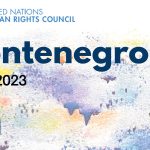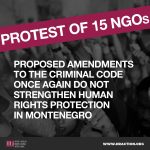- HRA kontakt
- Tel: +382 20 232 348
- hra@t-com.me
09/12/2010 Proclamation marking the 60th anniversary of the establishment of the International Human Rights Day
4/12/2010 The prize “Passion flame” awarded to Tea Gorjanc Prelevic, HRA executive director
04/12/2010
Proposed Reform of Liability for Breach of Honour and Reputation in Montenegro
25/12/201009/12/2010 Proclamation marking the 60th anniversary of the establishment of the International Human Rights Day
- Bearing in mind that respect for human rights and freedoms represents a basis for development of a democratic society and one of the main conditions for accession of Montenegro to the European Union;
-
Aware of the obligation to implement international human rights standards into domestic legal order;
-
Bearing in mind that all state institutions still do not base their actions on respect for universally accepted and recognized human rights;
-
Considering that the key problems regarding the protection of human rights in Montenegro are: insufficient training of public officials in key positions on human rights, inconsistent application of domestic regulations and international sources of human rights in practice, a large backlog of cases of rights violations and slow access to justice for citizens who report human rights violations, pressure on journalists and NGO activists, the situation in prisons and other places where persons are deprived of their liberty, slow and incomplete process of dealing with the past, threats and lack of protection of witnesses in these processes, discrimination against minority groups and individuals, unreasonably slow process of solving the problems of refugees,
On the occasion of 60th anniversary of the establishment of Human Rights Day, we announce a Proclamation calling upon:
- The Government, to dismiss Minister of Human Rights Ferhat Dinosa due to incompetence, intolerant and particularly homophobic attitudes; to terminate the agreement concluded with the U.S. Government in 2007 on the exemption of U.S. citizens from the jurisdiction of the International Criminal Court (ICC), which is contrary to the Constitution of Montenegro and the Law of ratification of the Rome Statute of the ICC; to propose necessary amendments to the Constitution and laws to Parliament, so as to improve the human rights guarantees, particularly those concerning the independence of judiciary and freedom of expression; to provide sufficient financing to the institution of the Protector of Human Rights and Freedoms (Ombudsman) and comply with his recommendations; to provide the necessary expertise and training of civil servants on human rights, particularly the Police Administration and the Institution for Execution of Criminal Sanctions; to take active measures to ensure that Roma, Ashkali and Egyptians integrate into the Montenegrin society through a process of compulsory higher education and employment; in cooperation with the governments of the region, to immediately improve and permanently solve the situation of displaced persons, in particular through simpler and faster procedures for issuing identity documents;
- The Parliament, to ratify the signed Optional Protocol to the International Covenant on Economic, Social and Cultural Rights, which would allow the submission of individual applications to the Committee on Economic, Social and Cultural Rights in cases of violation of these rights (the right to work and just conditions of work, to adequate housing, the rights deriving from scientific, literary and other artistic works, etc.) by state authorities; to initiate the necessary constitutional reforms to strengthen human rights guarantees, particularly regarding the independence of the judiciary, state prosecution, Constitutional Court and Protector of human rights and freedoms; to strengthen professional capacities in terms of the knowledge of international human rights standards, which are necessary for its legislative and control functions;
- The State Prosecution and the courts, to base their actions on respect for human rights standards; to consistently contribute to establishing the rule of law, particularly through effective investigation of human rights violations and punishing offenders without discrimination; the judges to respect and apply the standards set forth in the case law of the European Court of Human Rights and other international bodies responsible for monitoring the implementation of international treaties on human rights (Human Rights Committee, Committee on Economic, Social and Cultural Rights, Committee on the Rights of the Child, Committee against Torture, etc.); to strive to act transparently and regularly inform the public about the decisions made and actions taken; not to avoid cooperation with NGOs and the media and to respect their commitment to the rule of law and respect for human rights; to contribute to a greater degree of respect for human rights and dignity of persons with the limited freedom of movement and work to improve conditions and capacity of institutions where these persons reside; to conduct effective investigations in all cases of reported and generally known war crimes, also including command responsibility; to ensure the safety of witnesses in these processes; to actively and consistently protect discriminated minority groups and other individuals;
- The media, to ensure implementation of the Code of Journalists of Montenegro in their newsrooms and the work of the Self-regulatory Journalists Body; to refrain from sensationalism; to invest in professional training of journalists and investigative journalism; to ensure the right of reply and correction; to respect the presumption of innocence; to persist in efforts to promote human rights and rule of law;
- The political parties, to include into their programs the goals of improving human rights and provide activities for this purpose; when addressing the people to call for tolerance and develop the art of dialogue; to condemn and demand the prosecution of any cases of human rights violations; to condemn any pressure against journalists and NGO activists and work with them to improve the standards of human rights in the country;
- NGOs, though advocating for human rights and democratization of the society, to continue improving their capacities and setting an example of transparent and responsible behavior; to jointly confront any event of human rights violation and any form of pressure and assault; to coordinate their forces through mutual cooperation;
-
Citizens, to respect the national, ethnic, gender, sexual, political, religious and other differences between people; to refrain from violent conflict resolution and raise children in that spirit, while respecting their rights, too; to strive to get informed about their rights and report every case of discrimination and other violations of human rights to the competent state institutions; to require from the competent institutions prompt and effective investigation and punishment of those responsible for rights violations; to address national and international organizations and institutions to protect human rights in case of doubt that the relevant state institutions do not provide protection in accordance with the laws and international standards.
_
Boris Raonic, program director, Youth Initiative for Human Rights (YIHR)
Tea Gorjanc Prelevic, executive director, Human Rights Action (HRA)







 English
English